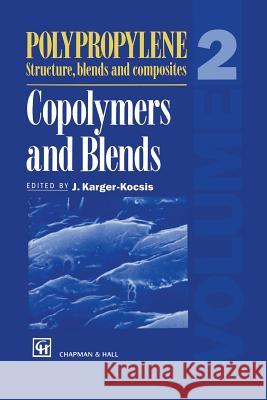Polypropylene Structure, Blends and Composites: Volume 2 Copolymers and Blends » książka
Polypropylene Structure, Blends and Composites: Volume 2 Copolymers and Blends
ISBN-13: 9789401042321 / Angielski / Miękka / 2012 / 205 str.
Although polypropylene has been marketed since the 1950s, research and development in this area is still vigorous. The consumption of polypropylene over the years has been relatively high, mainly due to the steady improvement of its property profile. Polypropylene: Structures, Blends and Composites, in three separate volumes, reflects on the key factors which have contributed to the success of polypropylene, dealing with all aspects of structure-performance relationships relevant to thermoplastic polymers and related composites.
Volume 1, Structure and Morphology, deals with polymorphism in polypropylene homo- and copolymers, where molecular and supermolecular structures are covered, and the processing-induced structure development of polypropylene, showing the interrelation between the processing-induced morphology and mechanical performance.
Volume 2, Copolymers and Blends, contains comprehensive surveys of the nucleation and crystallisation behaviour of the related systems. It includes the development of morphology and its effects on rheological and mechanical properties of polypropylene-based alloys and blends and a review of polypropylene-based thermoplastic elastomers.
Volume 3, Composites, gives a comprehensive overview of filled and reinforced systems with polypropylene as a matrix material, with the main emphasis on processing-structure-property-interrelationships. Chapters cover all aspects of particulate filled, chopped fibre-, fibre mat- and continuous fibre-reinforced composites. Interfacial phenomena, such as adhesion, wetting and interfacial crystallisation, are also included as important aspects of this subject.











